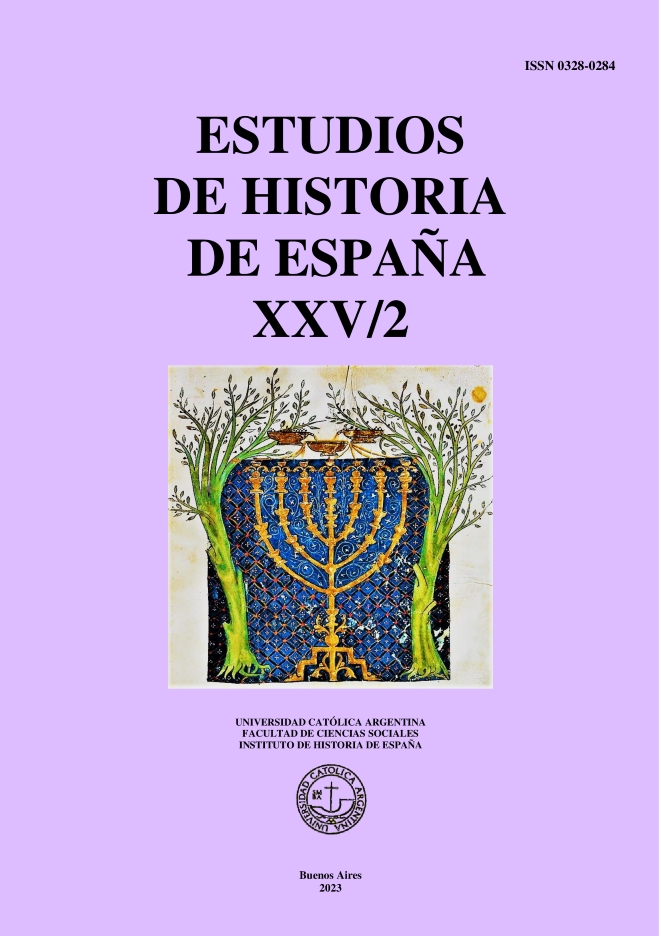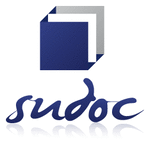The preface of de Comprobatione Sextae Aetatis in the context of the Christian-Jewish relations in the seventh century: analysis and translation
DOI:
https://doi.org/10.46553/EHE.25.2.2023.p166-183Keywords:
Julian of Toledo, Jews, Christians, Visigothic Kingdom, De comprobatione sextae aetatisAbstract
This study offers an analysis of the preface to the De comprobatione sextae aetatis, a work written by Bishop Julian of Toledo around 686, in the context of the Jewish-Christian relations in the Visigothic kingdom of Toledo. We will examine its content, the issues that motivated its production and the possible audiences imagined by the Toledan bishop. Furthermore, we offer a translation into Spanish of both the preface and the oration, the two texts accompanying the De comprobatione.
Downloads
References
ALBERT, Bat-Sheva, “Julian of Toledo’s (642-690) “De Comprobatione Sextae Aetatis”: An Original Use of Biblical Exegesis in Late Visigothic Spain?”, en HEIL, JOHANNES Y SHIMAHARA, Sumi (eds.), From Theodulf to Rahi and Beyond, Leiden, Brill, 2022, 43-62.
ALLEN, Michael I., “Universal History 300–1000: Origins and Western Developments”, en MAUSKOPF DELIYANNIS, Deborah, Historiography in the Middle Ages, Leiden, Brill, 2003, 17-42.
BAR-MAGEN NUMHAUSER, Alexander, Hispanojewish Archaeology. The Jews of Hispania in Late Antiquity and the Early Middle Ages through Their Material Remains, Leiden, Brill, 2021 (2 vols).
BARNEY, Stephen A.; LEWIS, W.J.; BEACH, J.A.; BERGHOF, Oliver, The Etymologies of Isidore of Seville, Cambridge, Cambridge University Press, 2006.
CAMPOS, Julio, “El De comprobatione sextae aetatis libri tres de San Julián de Toledo”, Helmantica, 18, 1967, 297-340.
CASTRO, Dolores, “¿Cuándo sobrevendrá el fin del mundo? Julián de Toledo y el Prognosticon futuri saeculi”, en MORIN, Alejandro, DELL’ELICINE, Eleonora, Francisco, Héctor y Miceli, Paola, Tener por cierto. Prácticas de la creencia de la Antigüedad romana a la Modernidad, Buenos Aires, Miño y Dávila, 2020, 159-180.
CASTRO, Dolores y LAHAM COHEN, Rodrigo, “Herejes espectrales, judíos hermenéuticos y ángeles celestiales para instruir cristianos. El De uirginitate de Ildefonoso de Toledo”, Studia Histórica. Historia Antigua, 39, 2021, 425-454.
CORDERO NAVARRO, Catherine, “El problema judío como visión del «otro» en el reino visigodo de Toledo. Revisiones historiográficas”, En la España Medieval, 40, 2000, 9-40.
DEL VALLE, Carlos, “Sobre las lenguas de los judíos en la España visigoda y Al-Andalus”, Sefarad, 63, 1, 2003, 183-193.
DREWS, Wolfram, The Unknown Neighbour: The Jew in the Thought of Isidore of Seville, Leiden, Brill, 2006.
GARCÍA MORENO, Luis A., “Expectativas milenaristas y escatológicas en la España tardoantigua (siglos V-VII)”, Arqueología, paleontología y etnografía, 4, 1998, 247-258.
GIL, Juan, “Judíos y cristianos en la Hispania del siglo VII”, Hispania Sacra, 30, 1977, 9-110.
GONZÁLEZ SALINERO, Raúl, “Apringio de Beja y los inimici ecclesiae: preocupación exegética y realidad social”, Euphrosyne, 27, 1999, 407-415.
GONZÁLEZ SALINERO, Raúl. “Confronting the Other: Isidore of Seville on Pagans, Romans, Barbarians, Heretics, and Jews”, en FEAR, Andrew, A companion to Isidore of Seville, Leiden, Brill, 2020, 359-396.
GONZÁLEZ SALINERO, Raúl, “The Legal Eradication of the Jewish Literary Legacy in Visigothic Spain”, en TOLAN, John; DE LANGE, Nicholas; FOSCHIA, Laurence; NEMO-PEKELMAN, Capucine, Jews in Early Christian Law. Byzantium and the Latin West, 6th-11th centuries, Turnhout, Brepols, 2014, 195-209.
HILLGARTH, Jocelyn N. (ed.), De comprobatione sextae aetatis, en HILLGARTH, J.N., BISCHOFF, B. Y LEVISON, W., Iulianus Toletanus Opera I (CCSL 115), Turnhout, Brepols, 1976.
JANSON, Tore, Latin Prose Prefaces. Studies in Literary Conventions, Estocolmo, Almqvist & Wiksell, 1964.
KRAEMER, R., The Mediterranean Diaspora in Late Antiquity. What Christianity Cost the Jews?, Oxford, Oxford University Press, 2020.
LAHAM COHEN, Rodrigo, “Entre la represión y la tolerancia. El derrotero de los judíos en tiempos de Gregorio Magno e Isidoro de Sevilla”, Trabajos y comunicaciones, 36, 2010, 13-35.
LAHAM COHEN, Rodrigo, “Identidades judías en la Europa tardoantigua: Erwin Goodenough y sus ecos”, Sociedades precapitalistas. Revista de Historia Social, 11, 2021, s/p.
LAHAM COHEN, Rodrigo y PECZNIK, Carolina, “Iudaei et Iudaei baptizati en la ley de los visigodos”, Anuario de la Escuela de Historia, 28, 2016, 141-169.
LANDES, R. “Lest the Millennium Be Fulfilled: Apocalyptic Expectations and the Pattern of Western Chronology 100-800”, en VERBEKE, Werner; VERHELST, Daniel y WELKENHUYSEN, Andries, The Use and Abuse of Eschatology in the Middle Ages, Leuven, Leuven University Press, 1988, 137-211.
MARTÍN IGLESIAS, José C., “Julián de Toledo”, en Codoñer, Carmen, La Hispania visigótica y mozárabe. Dos épocas en su literatura, Salamanca, Universidad de Salamanca, 2010, 155-172.
MARTIN, Céline, “Julián de Toledo, los judíos y el judaísmo”, Veleia, 37, 2020, 211-226.
MARTIN, Céline, “Les juifs visigothiques, un peuple hérétique”, en Les juifs et la nation au Moyen Âge, Revue de l’histoire des religions, 234-2, 2017, 315-335.
MARTÍNEZ DÍEZ, Gonzalo y RODRIGUEZ, Félix (ed.), La colección canónica hispana, v. 6: concilios hispanos: segunda parte, Madrid, Instituto Enrique Florez – CSIC, 2002.
MCDOWELL, Gavin, NAIWELD, Ron y STÖKL BEN EZRA, Daniel, Diversity and Rabbinization. Jewish Texts and Societies between 400 and 1000 CE, Cambridge, Cambridge University Press, 2021.
PABST, Stefan, Das theologische Profil des Julian von Toledo. Das Leben und Wirken eines westgotischen Bischofs des siebten Jahrhunderts, Leiden, Brill, 2021.
REYDELLET, Marc, “Les intentions idéologiques et politiques dans la Chronique d‘Isidore de Séville”, Mélanges d’archéologie et d’histoire, 82, 1970, 363-400.
ROTH, Norman, “‘Seis edades durará el mundo’. Temas de la polémica judía española”, La Ciudad de Dios, 199, 1, 1986, 46-47.
RUCQUOI, Adeline, “El fin del milenarismo en la España de los siglos X y XI”, en de la Iglesia Duarte, José Ignacio, Milenarismos y milenaristas en la Europa medieval: IX Semana de Estudios Medievales, Nájera, 1998, Logroño, Instituto de Estudios Riojanos, 1999, 281-304.
RUCQUOI, Adeline, “Mesianismo y milenarismo en la España medieval”, Medievalismo. Boletín de la Sociedad Española de Estudios Medievales, 6, 1996, 9-32.
VALLEJO GIRVÉS, Margarita, “Sensaciones bizantinas: las dos caídas de Jerusalén en la literatura del siglo VII”, Erytheia, 27, 2006, 43-72.
VIVES, José, (ed. y trad.), Concilios visigodos e hispanoamericanos, Madrid, CSIC, 1963.
WASSERSTEIN, David, “Langues et frontières entre juifs et musulmans en al-Andalus”, en Fierro, M., Judíos y musulmanes en al-Andalus y el Magreb. Contactos intelectuales, Madrid, Casa de Velázquez, 2002, 1-11.
WOOD, Jamie, The Politics of Identity in Visigothic Spain. Religion and Power in the Histories of Isidore of Seville, Leiden, Brill, 2012.
Downloads
Published
How to Cite
Issue
Section
License
Copyright (c) 2023 Dr. Dolores Castro, Dr. Rodrigo Laham Cohen

This work is licensed under a Creative Commons Attribution-NonCommercial-ShareAlike 4.0 International License.


































 Estudios de Historia de España
Estudios de Historia de España